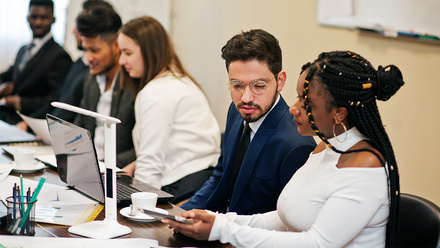The first order of business in alumni communications

When developing a communications programme for alumni, the tendency is to start by thinking about the media you’ll use. Non-profit organisation business consultant Tim Miles suggests that you begin by asking: What is the first order of business? While many might say that the first order of business is how and what you want to communicate to your alumni, Tim would disagree. The first order of business is to understand the goals and values of your alumni relations programme before you attempt to develop a marketing and/or communication plan.
The alumni relations programme, in most cases, is not a free-standing programme independent of its host institution. The goals and values of the alumni relations programme must be a subset of the goals and values of the university. Once the goals and values of the alumni relations programme are determined, they can then form the framework for its strategic plan. Goals and values of an institution can be refined to specifically meet the needs of the alumni relations programme. If one of the goals of the university is to produce global citizens, then a value of the alumni relations programme might be the engagement of international and transnational alumni in the university’s affairs.
Strategic planning
Ideally, one of the goals in the institution’s strategic plan will relate to the importance of the alumni relations programme to its further development. Since there are usually no more than five to eight strategic goals in an institutional strategic plan, the goal statement can be pretty broad and then individual strategies related to the goal statement can deal with specific parts of the university. An example of such a goal statement would be:
External Relations
The University will improve its reputation as an integral entity in higher education as related to its mission, with a particular focus on workforce development, diversified agriculture, applied science and technology, nursing and allied health, business management, and sustainability in the region.
The institutional strategic plan should be instructional in establishing the priorities for the alumni relations programme, for example:
Strategy: Expand and improve the college’s relationships with University alumni, so that the alumni may participate in and contribute to the growth and development of the institution.
Priorities:
- Establish goals for alumni participation and level of giving for alumni annual fund.
- Plan and execute six to eight alumni events throughout the year.
- Establish a consistent communications programme to keep alumni informed about developments at the university and engaged in the advancement of the university.
- Develop an international alumni–student mentoring programme targeting students during their study abroad experience.
Alumni experience
The university in this example is a polytechnic. Most students who attend this type of institution are focused on studying a particular discipline that will lead to a good career. The alumni experience then should reflect the expectations of an alumni body that is career focused. The message and media used to engage alumni must reflect the goals and values. The strategic plan outlines how it is to be implemented. The alumni experience, which includes the individual’s time as a student, is the tactical aspect of the cycle.
The nature of the alumni constituency can also influence the alumni experience. In the case of a polytechnic, where the curriculum is career and professions focused, professional meetings, conferences and conventions are a logical and inexpensive venue for alumni events. Rather than convincing the alumni to come to the university, the university can bring the university to the alumni.
Messaging
Based on the discussion thus far, what should the messaging targeted at the alumni from this polytechnic institution look like? Career focused people like to be successful. They like ideas and often are able to take the ideas generated by others and use it to develop a solution – application vs. research. Career-focused people tend to develop strong networks of like-minded people.
An attribute of all alumni is that they want affirmation that the decision they made to attend their university was a good one. Messaging should, therefore, focus on information that reinforces the reputation of the institution. There are a variety of messages that can support that goal. Stories of successful alumni, accomplishments of students, faculty, and staff, placement in various professional rankings, specialised accreditation – the list goes on. Applied education is very hands-on, and often faculty members and students become mentors and colleagues. The messaging to alumni should reinforce the values that attracted them to the institution in the first place: that the graduate’s relationship to the university is a personal one.
Most university constituents view their relationship with their university as bi-lateral. The other truism, if you will, is that the most important people in this bi-lateral relationship are the constituents, ie the alumni. Alumni see themselves in a personal relationship with the institution, so as you prepare the message based on the goals and values of the university, it is not only the ‘what’ but the ‘who’. Who should deliver the message? Messaging that reinforces the values message of the university should come from the top, ie from the president or rector. It can then be repeated and reinforced by others.
Media
There are so many channels that can be used to deliver the values-driven message of a university. The evolution of social media platforms such as Facebook and LinkedIn provide the platforms on which a personal relationship between the institution and its constituents can be developed. Understanding who your constituents are and how they prefer to communicate is important.
The alumni of a polytechnic institution are career focused. The media used in the alumni communication programme, therefore, should capitalise on the attributes of this population. Video, images, and succinct messages rather than text-driven forms of communication are appropriate. The choice of platforms to relay the message should reflect the style of messaging required for the alumni body.
Philip is an internationally-recognised expert in higher education strategy and management, as well as Chair of the EAIE Expert Community Alumni Relations.






